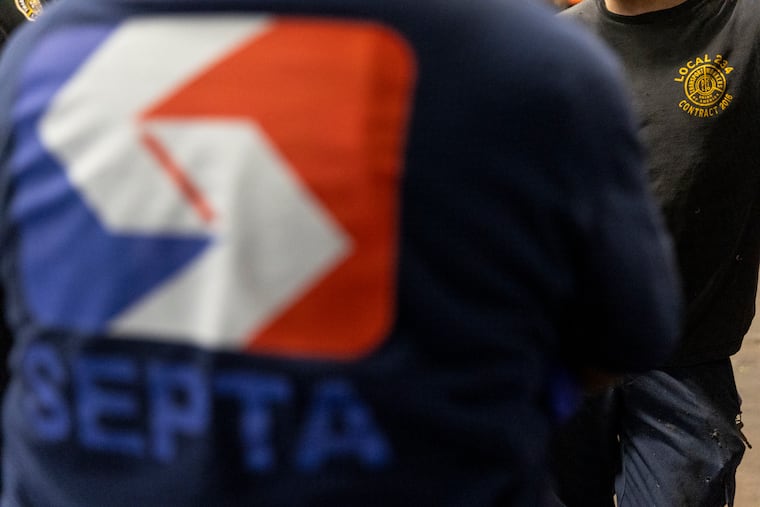SEPTA’s largest union voted to ratify new contract
The new contract increases wages by 7% across the board for Local 234 members, and provides each member a $3,000 signing bonus. SEPTA’s board is expected to consider the deal at its meeting Thursday.

Members of the Transport Workers Union Local 234 — the largest of SEPTA’s unions — voted Friday to ratify a one-year contract with the transit agency, the union announced.
The union said that its City, Frontier and Red Arrow bargaining units each voted to ratify the agreement. Votes were cast into the evening by secret ballot at worksites and bus depots across the city.
TWU Local 234 and SEPTA reached agreement on a tentative one-year contract Oct. 27, avoiding a city transit strike that would have hit Philadelphia hard.
“This was a good agreement for our members. It will put more money in our members’ pockets during a time of high inflation and help SEPTA with recruitment and retention,” TWU Local 234 president Brian Pollitt said in a statement.
“But, I want to emphasize that it is very much a work in progress. It is only a one-year agreement. Much work remains, especially as it relates to compensation, safety and security issues,” Pollitt said.
SEPTA said in a statement Friday night that the agency was “pleased that employees represented by TWU Local 234 have voted to ratify a tentative contract agreement. This tentative agreement is fair to SEPTA’s hard-working employees, and also takes into account the serious challenges the authority faces with the looming fiscal cliff.”
SEPTA’s board is expected to consider the deal at its monthly meeting Thursday, the agency said. The contract will expire in November 2024.
TWU Local 234 represents about 5,000 transit-vehicle operators, mechanics, maintenance workers, cashiers and custodians.
The new contract increases wages across the board for Local 234 members, along with providing a $3,000 signing bonus for each member, paid upon ratification of the deal by the union and SEPTA’s board. The wage increases would be paid in two installments: 4% on Dec. 10 and 3% on July 7.
Having a one-year term helps buy time for SEPTA to continue to press for financial help from the state government to cushion a projected fiscal crisis when the last of its federal pandemic aid, designed to keep public transit running as ridership plummeted during COVID-19, runs out next year. The agency projects a $240 million annual structural deficit beginning at the new fiscal year on July 1.
Pennsylvania’s House passed a bill Oct. 5 that would increase the share of the state sales tax dedicated to public transit. SEPTA and its sibling state transit agencies have lobbied for the measure, to help them survive what is called the “fiscal cliff,” an issue for public transportation authorities nationwide.
Under the bill, the state’s Public Transportation Trust Fund would receive 6.4% of the money generated by the sales tax, up from 4.4%, generating an additional $295 million annually for public transit operations across the state. The sales tax itself would not increase.
SEPTA projects that it would get new state funding of $190 million per year under the measure, which is awaiting action by the Republican-controlled state Senate.
TWU had also demanded public safety improvements amid an increase in crime and antisocial behavior on the transit system, to protect its members and riders, as well as help bring back former riders and attract new ones.
The two sides were not able to negotiate a strategy in the approved contract, but pledged to work together on the issue.
In the TWU contract, progression rates, the steps from starting pay to the top of the scale after 48 months, also were tweaked so workers will start with a greater percentage of the top hourly rate, currently $33.57 an hour for transit vehicle operators. Those changes, along with the general wage increase, would bring the pay of a starting operator from the current $20.14 per hour to $25.17 by July, union leaders told members in a memo.
Operators eligible for retirement would get a $2,500 retention bonus if they continued to work for SEPTA during the one-year deal. In the next year, about 700 operators either have 30 years of service or are 62 years old and thus qualify for a pension, Pollitt said.
SEPTA has a severe shortage of people to run buses, trolleys and subway trains, which has caused cancellations and delays, particularly on the far-flung bus routes. Both of the changes could help recruit and keep operators, Pollitt said.
The transit agency has been enrolling people in training, but it’s hard to attract new people to public transportation because the job has become harder with mandatory overtime and staff shortages, unpredictable schedules, and increasing abuse and assaults from the public.
Because candidates must first have a commercial driver’s license, which also requires training, they can often get better starting pay at trucking or package delivery firms, according to the union.
Other benefits for TWU members in the contract include an increased disability pension and work-rule changes.